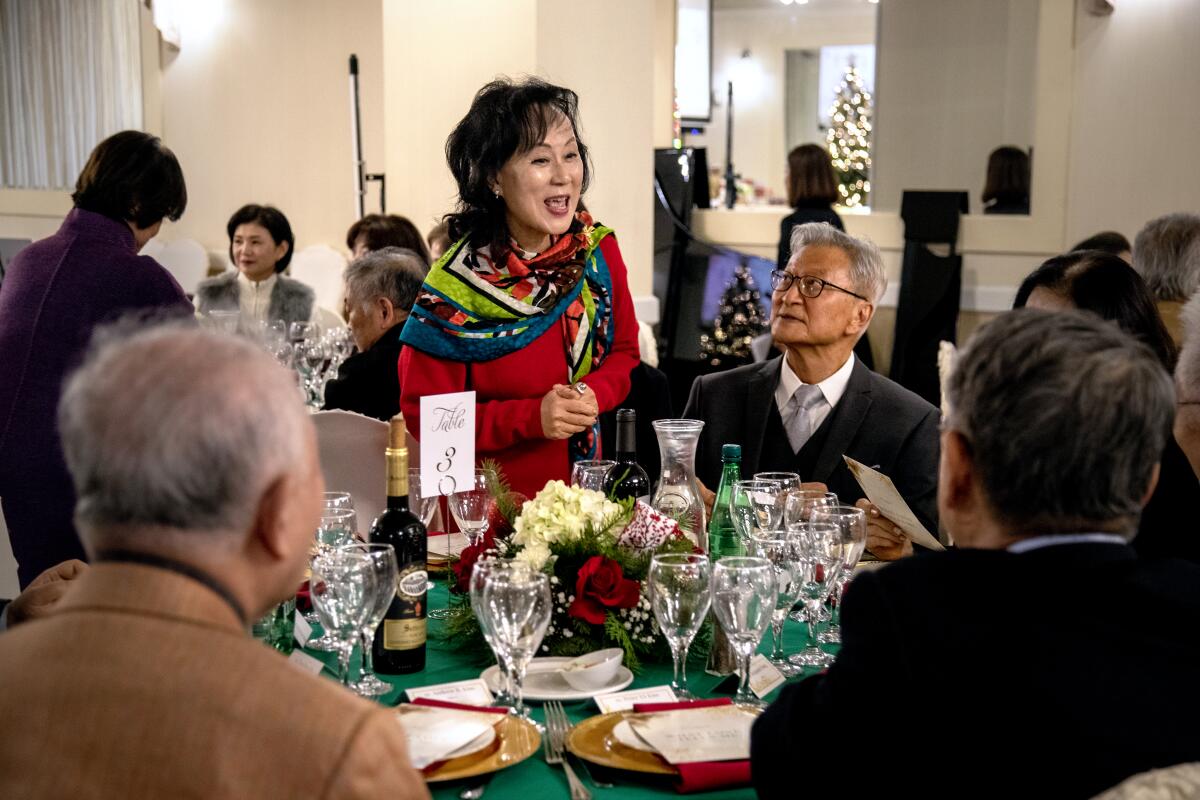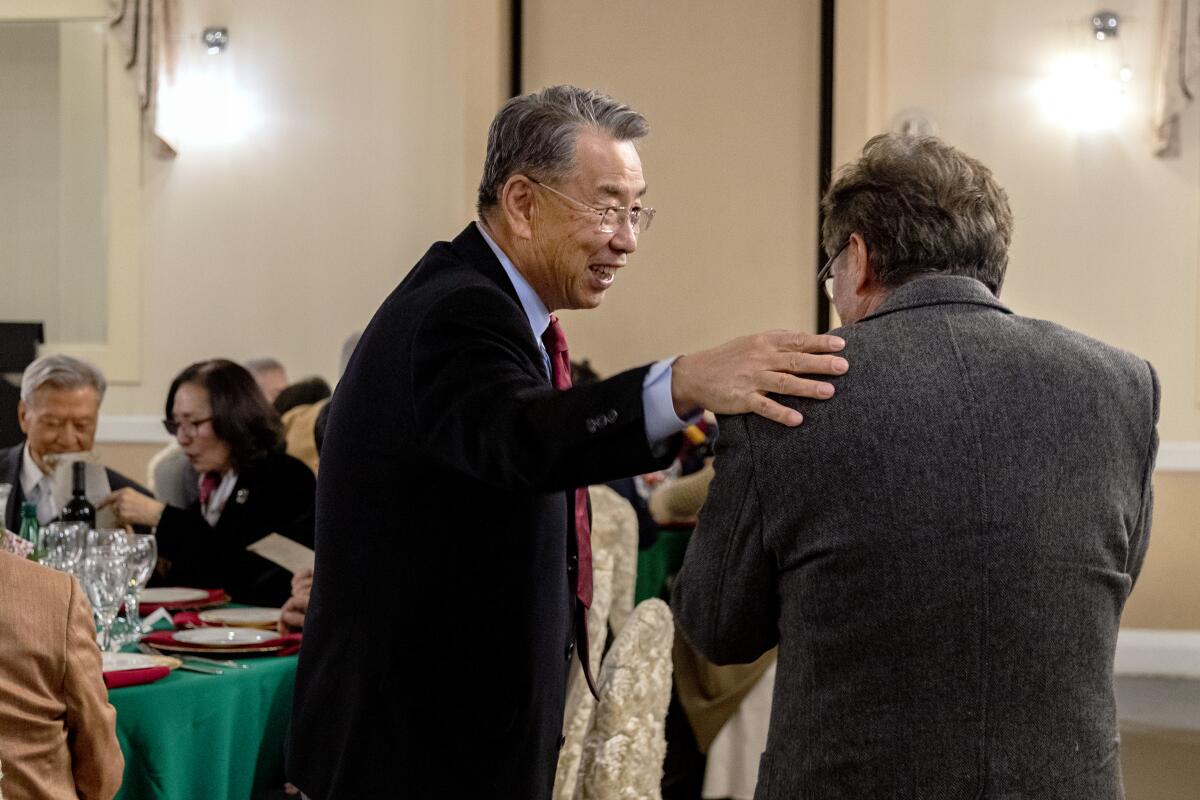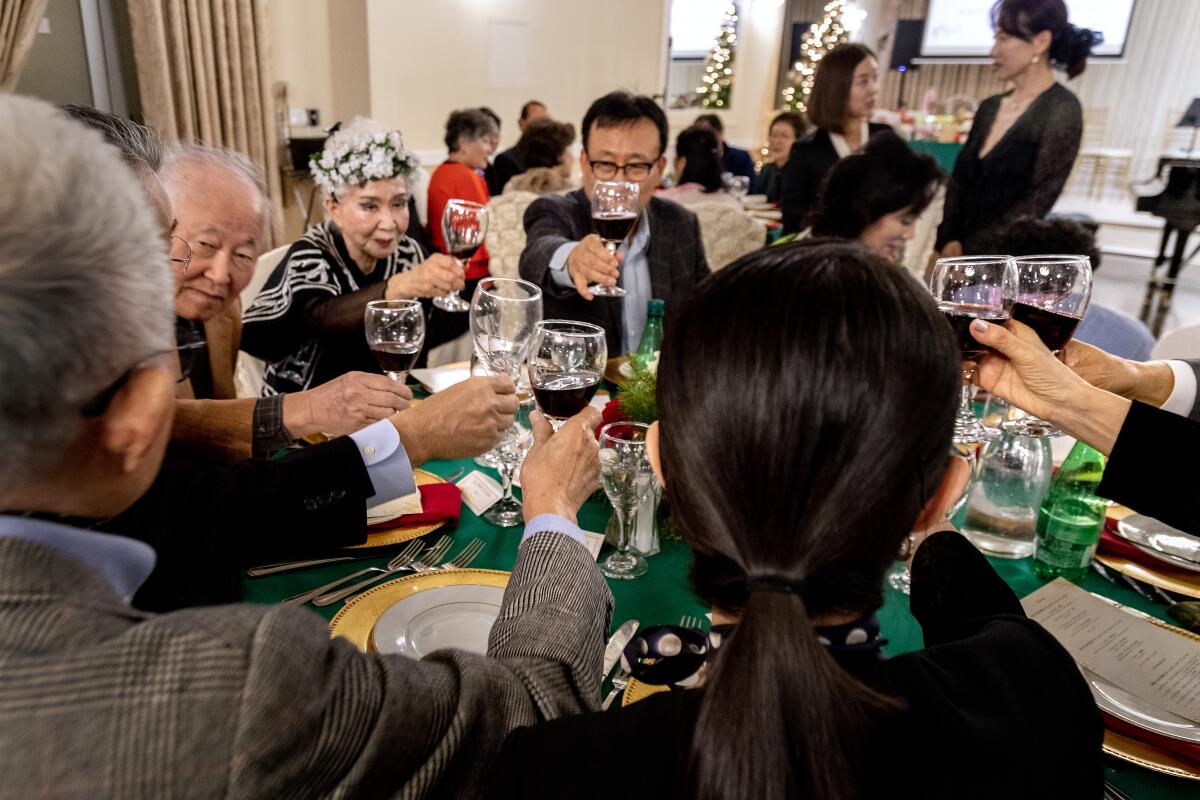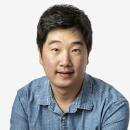Bonded by a high school in Korea, these immigrants gather for a ‘send off the year’ party

As the graduates of Seoul Arts High School and its sister junior high arrived at the banquet, they greeted one another with cries of “Sunbae-nim!” — older classmate — or “Hubae!” — younger classmate.
Their ages spanned decades. Most had not known each other in South Korea. But the bond they shared — having studied music, painting or dance at the prestigious arts schools — was strong.
On this late December evening in Koreatown, they were gathered for a traditional Korean song-nyeun-hwae — “send off the year” party.
The alumni group’s president, Young Ah Son, worked the room, posing for a selfie with Ho Hun Lee, an office worker in Torrance who studied ballet at Seoul Arts, class of 1984.
Son, who graduated in 1985 and had not met Lee until they both came to the U.S., was a music critic in South Korea, then followed her husband to the U.S. and became a homemaker.
“Living as an immigrant can be a lonely experience, akin to living in wartime, but these gatherings are so comforting,” said Son, 56, of Temecula. “It’s like meeting your family.”
In Los Angeles, Korean immigrants celebrate the end of the year with the groups that help them stay connected to other Koreans — churches, alumni associations, hometown associations.
After several years of pandemic hiatus, the year-end parties were back in full swing this December. Nearly 100 groups held song-nyeun-hwae in Koreatown this year, according to a list compiled by the Korea Times, including graduates of Seoul National University, those from the Jeolla region and those with roots in the North Korean province of South Hamgyong.

Some say the parties grew out of a centuries-old Japanese tradition called bōnenkai — mang-nyeun-hwae in Korean or “forget the year gathering” in English — that was imported to Korea during the Japanese colonial era in the early 20th century.
The “forgetting” usually involved copious amounts of alcohol, but that is not as common at today’s parties in Korea and in the U.S., which can be thought of as a blend between a holiday party and a New Year’s Eve party.
For immigrants, maintaining ties with other Koreans and meeting new friends through groups such as the Seoul Arts alumni association can be especially meaningful.
Many older Koreans went through “examination hell,” acing standardized tests to get into prestigious schools, said UC Riverside professor Edward Taehan Chang. Those school affiliations became a key part of their identities, even thousands of miles away in the U.S., especially for immigrants who came here before the 1980s, Chang said. The same is true of immigrants from other Asian countries.
It’s customary in Korea to address someone who was a grade or more ahead at school as “older classmate” and someone behind as “younger classmate.”
Kyung Hong, an 81-year-old retiree and president of the Kyunggi Girls’ High School’s Southern California alumni association, can still recall the school’s slogan: Be true, kind and beautiful.
Recently, about 80 alums from Seoul’s Paiwha Girls’ High School wore outfits that resembled their school uniforms — a black top and white collar — as they welcomed the school’s principal, who was visiting from Korea, said Eun Y. Kim, a 72-year-old retiree living in Hollywood and the outgoing president of the school’s Southern California alumni association.
These days, the alumni associations have declined in importance, as the high-stakes exam has been de-emphasized and people feel less strongly affiliated with their schools, Chang said.
Immigration from Korea has slowed, and younger immigrants are more likely to build their networks around hobbies or recreational activities, Chang said.

But for many in the L.A. area, the alumni associations, along with those organized around a common hometown in Korea, remain vital social outlets.
At the Seoul Arts High song-nyeun-hwae on Dec. 22 at a banquet hall on Wilshire Boulevard, Joy J. Song reminisced with Grace Kim about their high school teachers.
Kim, 67, a real estate agent who lives in downtown Los Angeles, graduated in 1973 and came to the U.S. about 40 years ago.
Song, class of ‘78, runs a piano academy in Korea and was stopping by the party while visiting family in L.A.
The two had never met. But as Song, 62, spoke of the 17 members of her family who also graduated from the school, it was as if they had known each other forever.
“There is something that bonds the students of the school,” Kim said.
After musical performances, mostly by alums, dinner got underway with about 130 guests. Lee, the Torrance office worker, was especially excited to sit next to an alum who had also studied ballet.
“I had never seen this sunbae-nim before,” Lee said. “There aren’t a lot of people who studied ballet.”
Then, it was time for a quiz.
When an emcee, Yong June Choi, asked who founded the school in 1953, about a dozen hands rose. The answer: Alice Rebecca Appenzeller, believed to be the first American born in Korea.
Sitting in the front, Karin Kim hoisted her arm even before Choi finished asking the next question: What is the school’s official flower?
“It’s a rose!” Kim yelled.
People sipped wine with their salmon or steak, but this was not a debauched song-nyeun-hwae of times past.
At one point during the quiz and raffle giveaway, a man stood up near the front: “Why are you [only] picking people in the back?” he shouted at the emcees.
Choi, who quipped that he considers himself an “honorary alum” despite giving up the violin after three months, tried to soothe the sunbae-nim.
“You must have had too much to drink,” Choi said as he grabbed a gift box and gave it to the heckler.
More to Read
Sign up for Essential California
The most important California stories and recommendations in your inbox every morning.
You may occasionally receive promotional content from the Los Angeles Times.










